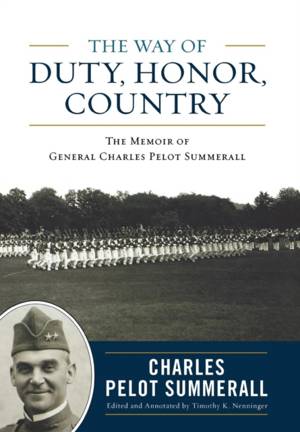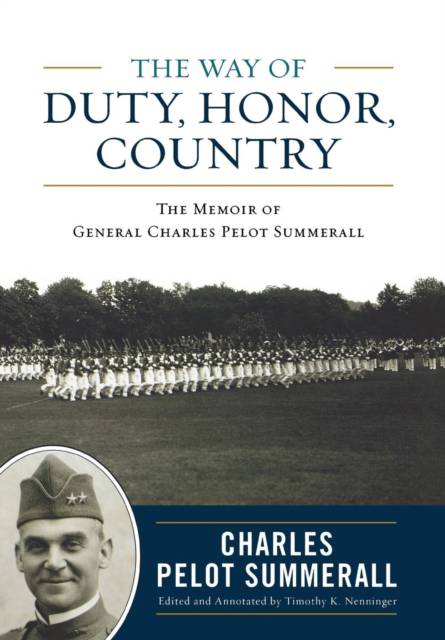
- Afhalen na 1 uur in een winkel met voorraad
- Gratis thuislevering in België vanaf € 30
- Ruim aanbod met 7 miljoen producten
- Afhalen na 1 uur in een winkel met voorraad
- Gratis thuislevering in België vanaf € 30
- Ruim aanbod met 7 miljoen producten
The Way of Duty, Honor, Country
The Memoir of General Charles Pelot Summerall
Charles Pelot SummerallOmschrijving
Born in rural Florida during the Reconstruction, Charles Pelot Summerall (1867-1955) enrolled in West Point in 1888. After graduating, Summerall's Army career helped to pull his family out of extreme poverty and set him on a path to eventually become a decorated war hero, four-star General, U.S. Army Chief of Staff, and President of the Citadel. Straddling the late 19th and early 20th centuries, Summerall's service began when the U.S. government was still conducting raids on the Plains Indians and ended after the country had survived two devastating global wars. The rapid advancement of war technology, particularly aviation and artillery, made Summerall's Army tenure one in which the very nature of war was irrevocably changed. As commander of the 1st Division in France during World War I, Summerall led three major operations, all of which were successful. Buoyed by his wartime performance and reputation, Summerall was appointed U.S. Army Chief of Staff in 1926, where he engaged in repeated administrative battles to stabilize the Army's dwindling resources. After his retirement in 1931, Summerall went on to serve as President of the Citadel, where he doubled enrollment, balanced the budget, garnered accreditation, and led the school to become a nationally recognized institution as opposed to a small regional military school.
Toward the end of his extraordinary life, Charles Pelot Summerall sat down with a yellow notepad and pen to write The Way of Honor, Duty, Country-a detailed personal and professional account of key life events, including major military conflicts and insights into critical moments in American military history. Ostensibly written as a "diversion," and without any plans for publication, Summerall's memoirs languished untouched by scholars for decades, available only in a private collection at The Citadel, until now. Historian Timothy K. Nenninger has edited and annotated Summerall's original manuscript, removing stylistic barriers such as three page paragraphs and including comprehensively researched footnotes. The result is a highly accessible work that sheds light on a formative period of U.S. Army history, as well as a celebrated soldier who lived through it. This book will be a valuable resource for military historians and a credit to UPK's growing military history list.
Specificaties
Betrokkenen
- Auteur(s):
- Uitgeverij:
Inhoud
- Aantal bladzijden:
- 328
- Taal:
- Engels
- Reeks:
Eigenschappen
- Productcode (EAN):
- 9780813126180
- Verschijningsdatum:
- 11/10/2010
- Uitvoering:
- Hardcover
- Formaat:
- Genaaid
- Afmetingen:
- 162 mm x 234 mm
- Gewicht:
- 598 g

Alleen bij Standaard Boekhandel
Beoordelingen
We publiceren alleen reviews die voldoen aan de voorwaarden voor reviews. Bekijk onze voorwaarden voor reviews.









